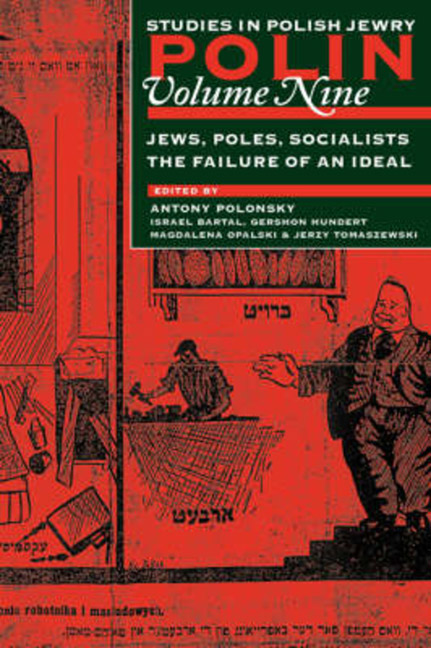Book contents
- Frontmatter
- Dedication
- Editors and Advisers
- Preface
- Acknowledgement
- Polin
- Polin: Studies in Polish Jewry
- Contents
- Note on Transliteration, Names, and Place Names
- Abbreviations
- Introduction
- PART I POLES, JEWS, SOCIALISTS: THE FAILURE OF AN IDEAL
- Jewish Socialists in the Kingdom of Poland
- The Jewish Problem in Polish Socialist Thought
- The Relation of the Polish Socialist Party: Proletariat to the Bund and the Jewish Question, 1900-1906
- The Jews, the Left, and the State Duma Elections in Warsaw in 1912: Selected Sources
- Jews and the Russian Revolution: A Note
- The Bund in Poland, 1935-1939
- Łodź Remained Red: Elections to the City Council of 27 September 1936
- The Jews of Vilna under Soviet Rule, 19 September-28 October 1939
- The Polish Underground and the Extermination of the Jews
- The Jewish Underground and the Polish Underground
- The Pogrom in Kieke on 4July 1946
- Antisemitism in Poland in 1956
- PART II NEW VIEWS
- PART III REVIEWS
- REVIEW ESSAYS
- BOOK REVIEWS
- Bibliography Of Polish-Jewish Studies, 1993
- Notes on Contributors
- Notes on Translators
- Glossary
- Index
Antisemitism in Poland in 1956
from PART I - POLES, JEWS, SOCIALISTS: THE FAILURE OF AN IDEAL
- Frontmatter
- Dedication
- Editors and Advisers
- Preface
- Acknowledgement
- Polin
- Polin: Studies in Polish Jewry
- Contents
- Note on Transliteration, Names, and Place Names
- Abbreviations
- Introduction
- PART I POLES, JEWS, SOCIALISTS: THE FAILURE OF AN IDEAL
- Jewish Socialists in the Kingdom of Poland
- The Jewish Problem in Polish Socialist Thought
- The Relation of the Polish Socialist Party: Proletariat to the Bund and the Jewish Question, 1900-1906
- The Jews, the Left, and the State Duma Elections in Warsaw in 1912: Selected Sources
- Jews and the Russian Revolution: A Note
- The Bund in Poland, 1935-1939
- Łodź Remained Red: Elections to the City Council of 27 September 1936
- The Jews of Vilna under Soviet Rule, 19 September-28 October 1939
- The Polish Underground and the Extermination of the Jews
- The Jewish Underground and the Polish Underground
- The Pogrom in Kieke on 4July 1946
- Antisemitism in Poland in 1956
- PART II NEW VIEWS
- PART III REVIEWS
- REVIEW ESSAYS
- BOOK REVIEWS
- Bibliography Of Polish-Jewish Studies, 1993
- Notes on Contributors
- Notes on Translators
- Glossary
- Index
Summary
ANTISEMITISM was one of the problems that surfaced in Poland in 1956, along with the crisis of authority and the Stalinist system. Many link the emergence of this anti-Jewish sentiment to the struggle within the Polska Zjednoczona Partia Robotnicza (PZPR: Polish United Workers’ Party), i.e. the conflict between the more hard-line ‘Natolin’ and more liberal ‘Puławy’ factions. This is the position of both Witold Jedlicki, author of the essay ‘Chamy i Żydy [The Boors and the Kikes]’, one of the most influential and popular portrayals of the October period, and Michał Chęciński, whose book Poland, Communism, Nationalism, Antisemitism, published in 1982, attempted a comprehensive portrayal of antisemitism in postwar Poland. Krystyna Kersten, in her recent book on Polish-Jewish relations, also stressed the primarily instrumental character of the antisemitism of 1956: ‘The Jewish question, somewhat mythologized and mainly artificial, became a spectacular weapon in the struggle of competing party factions.'
Both Jedlicki and Chęciński believed that the antisemitism of 1956 was largely ‘imposed from above’ in an orchestrated way. It was ‘thrown at’ the public by the Natolin group, which used it to achieve its own political goals: to gain social support and a new political-ideological base to replace the lack of support for Communist ideology, obvious even to the most dogmatic believers; to relieve and neutralize the disappointment and growing frustration that threatened to turn against the existing system and the governing group; and finally to discredit the more liberal and reform-orientated Pulawy group by presenting them to the masses as ‘the Jews’. The most public events supporting this line of reasoning were the addresses of Wiktor Klosiewicz at the sixth plenary session of the central committee of PZPR, and of Zenon Nowak at the seventh one. Klosiewicz's objection to the candidacy of Roman Zambrowski, proposed as a member of the central committee's secretariat, was that ‘the nation would receive such an appointment unfavourably'-a remark which, in view of the candidate's Jewish parentage, was interpreted as an antisemitic statement. At the seventh plenary
- Type
- Chapter
- Information
- Jews, Poles, Socialists: The Failure of an Ideal , pp. 170 - 184Publisher: Liverpool University PressPrint publication year: 2008

